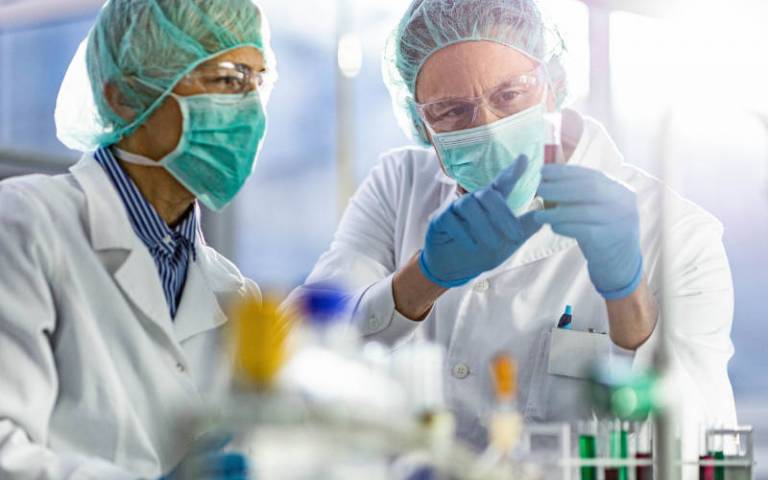UCL developing drug to help prevent future coronavirus pandemics
12 April 2021
UCL’s Translational Research Office (TRO) Drug Discovery Group is working on a small molecule drug that could play a pivotal role in preventing future coronavirus pandemics.

While significant progress has been made with vaccines to tackle COVID-19, it's widely acknowledged that this won’t be the last coronavirus that passes to humans. So, how can we better prepare for the epidemics caused by viruses that will inevitably follow?
This is the question that’s driving the work of The Small Molecule Therapeutic Innovation Network (TIN) at UCL. The TIN draws together a wide range of research interests across the university with a focus on small molecule therapeutics. One particular team, the TRO Drug Discovery Group (DDG) is working on a small molecule drug that could help to prevent future coronavirus pandemics.
Although still in its early stages, the team has already identified a compound that could form the basis for a new anti-coronavirus drug.
How small molecules can make a difference
Dr Richard Angell from the TRO Drug Discovery Group, who’s heading up this work, explained:
“In the face of COVID-19 and rapidly emerging viral pandemics, the traditional approach to antiviral research has proven unlikely to produce therapeutics in a timely manner. Although work on COVID-19 vaccines has been tremendously successful, nevertheless their development can take a long time. That work also, of course, cannot begin until a new pathogenic virus has started to emerge. We’ve been exploring a different approach to pandemic preparedness, using antivirals, that could work alongside any future vaccines.”
Richard and his team are working on a new antiviral drug to inhibit a particular set of proteins within the coronavirus family at a molecular level.
The polymerase proteins are found in all viruses in the coronavirus family, and are one of its “most highly conserved” parts. So, by developing a drug that inhibits these proteins specifically, it's likely to work not just on COVID-19 but on future coronaviruses as well.
Richard explained: “In the case of coronaviruses, there is a 98% similarity within the polymerase proteins between SARS and SARS-CoV-2. If a SARS-CoV-2 (the virus that causes COVID-19) polymerase inhibitor is identified and developed, we expect it to be effective on SARS and other members of the coronavirus family. Antivirals could then be developed, stored and used against a newly emergent coronavirus epidemic.”
A collaborative approach
Richard and his team have redeployed their experience in discovering inhibitors for other viruses in response to the current pandemic. The team received Higher Education Innovation Fund (HEIF) early-stage commercialisation funding, managed by UCL Innovation & Enterprise, to kickstart the project.
“The funding was instrumental in helping us get this work moving very quickly. It allowed us to buy a large compound library to screen for COVID small molecule inhibitors. We’ve been working closely with other key partners globally as well, including Oxford, and Monash in Australia,” said Richard.
To ensure their response is informed by commercial insights, Richard has joined industry-experienced antiviral drug discoverers to establish a not-for-profit Collaborative Community against Coronavirus, 3C. Focused on discovering new treatments for emergent coronavirus infections, the company brings together a group of world-leading experts, with proven backgrounds in antiviral drug discovery.
Using philanthropic donations, the company has completed antiviral screening at KU Leuven University and is about to move to the next stage of the drug discovery process.
“It’s still early stages, but we’ve made great progress in a relatively short time. We have already identified some lead molecules which look like promising starting points for the discovery of future drugs.”
Leading the way in small molecules
Coordinated by the UCL Translational Research Office, the Small Molecule TIN spans multiple research areas, working with all partners to move UCL science towards new drugs for poorly treated diseases.
Kathryn Walsh, Executive Director, UCL Innovation & Enterprise, commented: “This piece of work represents a significant step forward in UCL’s COVID-19 response and underlines our globally-renowned expertise in small molecule drug discovery. It could play a pivotal role in preventing future pandemic outbreaks.”
Listen to Dr Richard Angell discuss the promising future of antivirals in Episode 7 of the UCL Podcast, 'Coronavirus: The Whole Story'.
Links
Find out more about:
- Collaborative Community against Coronavirus, 3C
- Small Molecule Therapeutic Innovation Network
- UCL Translational Research Office Drug Discovery Group
- UCL Translational Research Office
- Early stage commercialisation funding for UCL staff
Photo © skynesher (iStock)
 Close
Close

